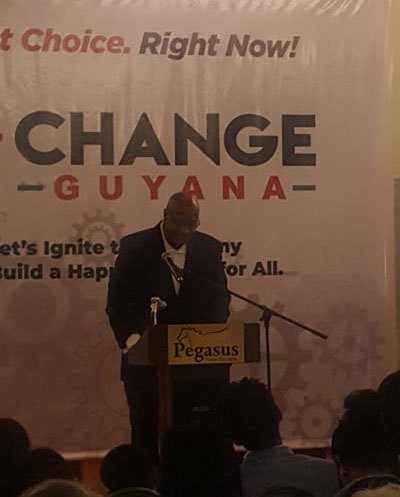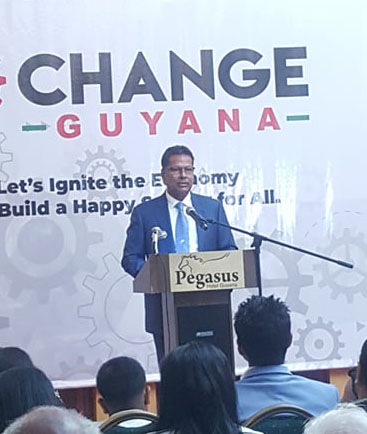The Change Guyana political party was officially launched last evening with its presidential candidate Robert Badal making a call for voters to embrace what he called the visionary leadership needed to create jobs and reduce poverty.
“Since independence the rules of the game has been set by two political groups. Each mirrors the other, like two sides of the same coin. They are both ethnically-dominated, controlled by a few, make rules that benefit themselves and their friends. The wider members of their group are mere cheerleaders; the rest of us have to struggle to make ends meet. The result is a country that is poor, has a narrow export base, and no plan to take us out of this quagmire. The natural consequence is that our people fled our shores, are disrespected, often humiliated and put to wait on a bench when they travel overseas. Our underdevelopment is not for want of skills—our youths are among the brightest in the region; just last week our robotics team won the Albert Einstein Gold Medal award in Dubai— the problem is the lack of visionary leadership at the highest level that would direct our skills and energies towards rapid development,” Badal told attendees at the launch, which was held at the hotelier’s Pegasus Hotel in Georgetown.

He took aim at the records in office of the major parties, while charging that their lack of vision has failed to uplift the citizenry economically.
“Politicians in Guyana have created no jobs and they never will, no matter what they promise during this election period,” he said. “Jobs do not grow on trees… It requires harnessing the unique, natural and competitive advantages to add value in the form of a product or a service that satisfies or create a demand. Sustainable job creation takes place when such a product or service is competitive in price, quality and reliability, viz a viz that produced by others,” he added.
Badal stressed that after more than 50 years of independence, many people across the country have the same difficulties supporting a household on the wages they earn, while others are jobless.
“The average cost of living for a household is around $120,000 per month, taking into account just food, while the per capita income is just around half of that. Families are having difficulties with school fees, transportation and healthcare. Mortgage rates are high and buying a car is a far end dream of many. With spiraling crime, daily blackouts, high unemployment, the hopelessness continues. Eighty percent of our graduates flee our shores in search of opportunities that are denied them at home,” he said.
“On top of these, the flames of racial divide continue to be ignited by our political leaders as a means of securing yet another term in office, without offering anything new, but the same old empty promises. They have failed us before and they will continue to fail us if we continue to make the same choices our parents have made since independence. The simple reason is that they have displayed no vision for the economic upliftment of our country, no track record of wealth or job creation or business development,” he added.
Badal also described the laying off of the labour force in the bauxite and sugar industries as wrong moves.
“A case in point is the closure of bauxite processing and Rose Hall sugar estate in East Berbice. These industries were taken over as thriving businesses at independence. No alternative development was made or encouraged in East Berbice, plunging the surrounding communities into depression,” he said.
He argued that it is crucial to offer incentives for desired development goals. Using an anecdote from his own life, Badal recalled that while growing up his sister would always trump him academically. He said he was not bothered until he heard his father promise her that he would make her a gold chain if she got first place in class the next term. Believing that the same fortune would be bestowed upon him, he said he worked and gained first place. “Incentives play a significant role in directing behaviour,” he posited.
With both Badal and his running mate, chartered accountant Nigel Hinds, having backgrounds in business, he said they have the experience to reach desired goals as they firmly believe that the human resources are already here.
“I have created such jobs in 1998, when I bought and modernised a poultry feed plant. I did so again in 2007, when I built a state-of-the-art parboiled rice plant, adding value to the rice planted by farmers all across our country. My investments in the Pegasus Hotel and now its US$100 million expansion creates sustainable high paying jobs and sustains the lives of thousands across Guyana. Sustainable job creation requires investments to industrialise Guyana, using our rich agricultural lands, our dense forest and seafood rich coastline, our petroleum resources, bauxite and other mineral resources, the sun, sand and skilled Guyanese labour. This is what brings development and creates sustainable jobs. For poverty reduction, development through investments must be more balanced in all regions. Our economy is still largely based on basic commodities, the value and jobs are added in other countries,” he stressed.
And with Hinds, a former Citibank financial analyst who the party says “now advises businesses of all kinds, on investments, growth and development,” Change Guyana believes voters have evidence that they will get the job done.
Badal read the party’s objectives: “Provide strong, visionary and inclusive leadership at the political and economic levels. Harness the creativity, innovation and hardworking spirit of Guyanese to build a strong, open and vibrant economy that progressively elevates our current depressed standard of living. Inspire unity and harmony among all races, and social partners, by restoring public confidence in an open, honest and accountable government. Arresting the ever spiral of corruption in public office by elevating standards of living, stronger integrity legislation and enforcement. Inspire a culture of entrepreneurship to direct wealth creation through broad based fiscal incentives, lower taxes, and removing bureaucratic obstacles. A programme of fiscal, structural and economic reform. Encourage strong religious freedom that builds strong family traditions and communities.”

